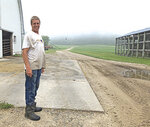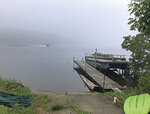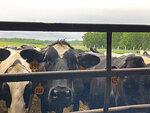GREY EAGLE, Minn. – Marc Brinkman is an extrovert. This comes in handy for the Grey Eagle farmer, who on any given day may have a visitor step into the barn while he is milking his 40 cows. Oftentimes in the summer, the evening milking can take a little longer than usual.
“I can be a bit sociable sometimes,” Brinkman said. “On weekends, it can take an extra hour to do chores because people stop by and talk.”
The visitors come from the many cabins and lake homes that are accessed with the help of a cartway that runs through the farm, just a few feet from the barn. Not even a township road, the private cartway has been there since people began building rustic cabins along the lake many years ago.
“My driveway is literally a freeway on the weekends,” Brinkman said.
Lake life and farming blend together for the Brinkmans, who are the third generation of the family to farm the land. Marc and his wife, Julie, are parents to Justin, Hailey, Jailyn, Mady, Camryn and Josh.
They have 320 acres of land; the home place is 140 acres with 40 tillable and 100 acres of woods and pasture.
Visitors are often surprised to find themselves in the middle of a farm yard. They turn off the county road onto the gravel road and, when they drive into the Brinkman yard, they often turn around, Brinkman said.
For the cabin residents, their year-round road is aptly named Amigo Trail. They have a friend in Brinkman. His philosophy is one of cooperation and communication.
“Some of my best friends growing up were lake people,” Brinkman said. “If you want to have good neighbors, be a good neighbor. Of course, you set expectations, like take it easy through the yard, and the biggest thing is keeping them off the silage bags.”
For people who have not grown up in the country, Brinkman takes this as an opportunity for education and for him to keep in mind others do not always understand things that to him are obvious.
“So many people have never seen cows before, and they are amazed at how big they are,” he said. “You explain these are animals, not people; I always tell people there’s a reason why cows can reproduce in two years, because their life expectancy is not that of a human.”
People love seeing calves being born. One of his favorite stories is when a couple with their little girls stopped years ago when a calf was born on the Fourth of July. They called it Freedom and checked in on the calf and kept track of it in the herd throughout its lactations. The girls are now grown and have become like extended family, as have others with cabins nearby.
People are always curious about the farm and concerned about how the crops are coming along. Part of the ease in relationships with the neighbors has come through Brinkman’s involvement in the lake association, which he joined when taking over the farm from his parents. When he attends meetings, he gets teased with things like, “You were late for milking one morning,” or, if the cows make a little extra noise, “You need to feed your cows a little.”
The farm has changed over the years. When Marc’s grandparents, William and Ludwina Brinkman, bought it, there was no such thing as concern for the environment. Sewer pipes from lake homes fed directly into the lake, cows always went down to the lake to drink, and, in those days, the kids were not allowed to swim in the dirty water.
“Years ago, that’s the way it was; people didn’t think anything of it,” Brinkman said. “Not that they were bad people; they didn’t think (about it or) know any better.”
By the time Brinkman was growing up, the middle of 12 children of Eugene and Mary Lou Brinkman, the lake water was much cleaner.
“Myself, from growing up until my 40s, I just wore a pair of shorts, no shirt, never a pair of shoes,” he said. “We went out and milked the cows, and afterward, we’d jump in the lake, shorts and all, and wash our hair with shampoo we had down there. It was so refreshing.”
The lake near the shore of the farm was always considered a good fishing spot, and it still is today. A manure pit was installed long ago to keep runoff out of the water.
Looking at the pontoon down by the dock only 20 yards or so from the house, Brinkman was reminded of a time several years ago when a yearling heifer got out, ran down to the lake and jumped into the water. They took the pontoon out to corral the heifer and guide it back to shore.
“Now, I can use the pontoon as a tax deduction,” he said.
What is in their future with 4,000 feet of shoreline on the farm? Most likely, the dairy will not continue. Marc and Julie would be thrilled to have their family close, even to have their own places nearby. Already, one daughter lives across the narrow stretch of the lake.
The farm land will likely stay in the family.
“I could cash in on this place and be miserable with a lot of money the rest of my life, or I can be in this place and be happy,” Brinkman said.
When asked if he is glad he kept the farm small, the answer was immediate.
“I am absolutely glad I did,” he said. “As far as passing it on, it would be nice to have upgraded some things; it was sort of an old modern. But ultimately, in life, simple is always better. I like to keep simple as long as you can pay the bills.”
Brinkman said the kids would agree.
“My kids thank me all the time; they say, ‘We had the best life ever,’” Brinkman said. “This is like heaven out here.”



Comments
No comments on this item Please log in to comment by clicking here